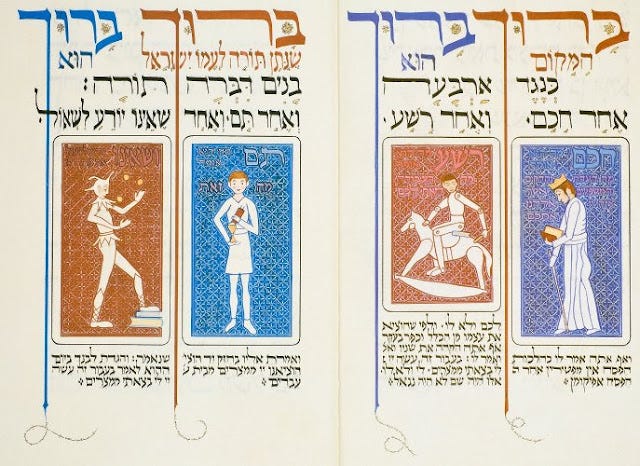The Alternative Version of the Four Sons (Incomplete)
Click here for a printer friendly version of this blog post.

The Alternative Version of the Four Sons
One of the most well-known sections of the Hagadah is the Arbaah Banim (Four Sons). What people may not realize is that there are two equally authoritative versions of the Arbaah Banim - one of which made it into the mainstream text of the Hagadah, and one which did not. The version that made it into our Hagadah is from the Mechilta, and alternative version can be found in the Talmud Yerushalmi.
Here is a translation of the standard Mechilta version.
The Torah addressed itself to four sons – one wise, one evil, one simple, and one who does not know to ask.
The Wise Son – what does he say? “What are the testimonies, the decrees, and the statutes which Hashem, our God, has commanded you?” (ibid. 6:20). And you, too, should tell him a law like the laws of the Pesach sacrifice: we do not conclude the meal with anything other than the Pesach sacrifice.
The Evil Son – what does he say? “What is this service to you?” (Shemos 12:26). “To you,” but not to him. Since he excluded himself from the group and denied the fundamental principle – you, too, should blunt his teeth and say to him: “It is because of this that Hashem did so for me when I went out from Egypt” (ibid. 13:8). “For me,” but not for him; had he been there he would not have been redeemed.
The Simple Son – what does he say? “‘What is this?’ And you shall say to him: ‘With a strong hand Hashem took us out from Egypt, from the house of slaves’” (ibid. 13:14).
Concerning The Son Who Does Not Know to Ask – you initiate [a conversation] for him, as it is stated: “And you shall tell your son on that day, saying: ‘It is because of this that Hashem did for me when I went out from Egypt’” (ibid. 13:8).
And here's the Yerushalmi version. Note the differences as you read:
R’ Chiyya taught: the Torah addressed itself to four sons: a wise son, an evil son, a foolish son, and a son who doesn’t know to ask.
The Wise Son – what does he say? “What are the testimonies, the decrees, and the statutes which Hashem, our God, has commanded us?” (ibid. 6:20). And you, too, should tell him: “With a strong hand Hashem took us out from Mitzrayim, from the house of slaves” (ibid. 13:14).
The Evil Son – what does he say? “What is this service to you?” (Shemos 12:26) – “What is this burden which you burden us with each and every year?” Since he removed himself from the group, then you, too, should say to him: “It is because of this that Hashem did so for me when I went out from Mitzrayim” (ibid. 13:8). “For me,” but not for that person; if that person had been in Mitzrayim, he wouldn’t have been worthy to be redeemed from there forever.
The Foolish Son – what does he say? “‘What is this?” (ibid. 13:14). You, too, should teach him the laws of Pesach: that we do not conclude the meal with anything other than the Pesach sacrifice; that one should not get up from one group and enter another group.
Concerning The Son Who Does Not Know to Ask – you initiate [a conversation] for him.
Notice the differences? Most of them are minor, but there are a few major ones. Let's formulate our questions on the two biggest differences:
Why are the answers to the Wise Son and Simple/Foolish son swapped? According to the Mechilta, we respond to the Wise Son's question by teaching him the detailed laws of Pesach and we respond to the Simple Son's question with a general account of Yetzias Mitzrayim (the Exodus from Egypt). According to the Yerushalmi's version, the lesson in halacha is reserved for the Foolish Son and the story of Yetzias Mitzrayim is told to the Wise Son. On the surface, the Mechilta makes more sense: the Wise Son asked about the mitzvos, and we respond by teaching him the halachos which comprise those mitzvos.
What insight do we gain from the Yerushalmi's addition to the Evil Son's question? According to the Mechilta the Evil Son merely asks, "What is this service to you?" but in the Yerushalmi he adds: "What is this burden which you burden us with each and every year?" The Ritva, in his Hagadah commentary, elaborates even further: "What is this burden which you burden us with each and every year, to delay our meal and ruin the joy of the festival?"
Those are the questions I intend to answer, but it looks like the answers will have to wait until after Pesach. Let me know what you think! Chag sameach!



